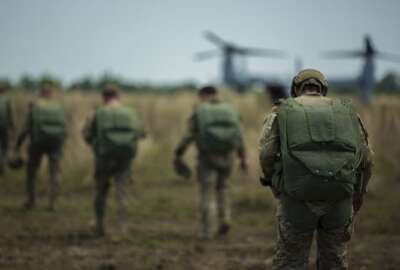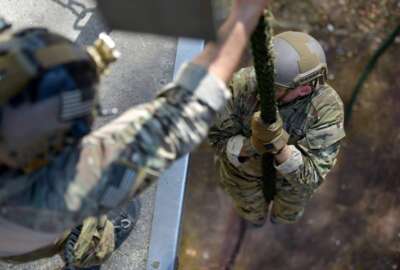
Nonprofit Global SOF Foundation advocates for tight-knit special operations community
Stu Bradin, president and CEO of the Global SOF Foundation, shares how the nonprofit he founded four years ago helps to advocate for the global special operations...
The special operations forces community is a small one relative to the rest of the military. This tight-knit network fosters a sense of loyalty so strong that, in one sense, no one ever leaves.
Numerous former special operators work in supporting foundations devoted to the care and betterment of Special Operations Forces (SOF).
That’s certainly the case of Stu Bradin, president and CEO of the Global SOF Foundation, a 501(c)(3) nonprofit that advocates for special operations globally. In 2014, he retired from the military with about 32 years of service, 28 of which were in the special operations community.
During the recent Special Operations Forces Industry Conference in Tampa near Global SOF headquarters, Federal Drive with Tom Temin spoke with Bradin on Agency in Focus — SOCOM about the work the foundation has done in its four years of existence.
“A lot of it is education,” Bradin said. “We’re an educational nonprofit, so you have a lot of young staffers in any Parliament or any Congress, and so you’ve got to focus on making sure they understand everything so they could present that to their principles in a coherent manner.”
With nearly 2,000 individual members and 74 corporate partners across 64 countries, Global SOF helps SOCOM continue to be a relevant part of global security.
“There’s a lot of turnover in those folks, because they’re young people and they’re there a year, maybe two years and they’re gone,” Bradin said. “So it’s a never ending piece. We do that in a lot of countries, a lot of ministers of defense and people inside the MoDs, they’re not really familiar with special operations. They come from the private sector and have no military background whatsoever. A lot of them are very leery of their own people. They’re not so trusting depending on what country we’re talking about. So having a group of Americans from a nonprofit that can talk to them with no strings attached has been reasonably effective so far.”
What has become a challenge for SOCOM in recent years is how it’s been characterized in each new National Defense Authorization Act, as the Pentagon has changed its approach to special operations and low intensity conflict (SOLIC).
“What you’re seeing is an evolutionary thing and not something that’s really a major deal,” Bradin said. “If you go back to when the Nunn-Cohen Amendment formed U.S. Special Operations in 1987, there was a move afoot to make it a separate service and the compromise with the service chiefs and everybody was to form U.S. SOCOM and give it major force programming — MFP 11 — money, so it could do its thing.”
Latest Defense News
“They really don’t have all of the servicelike authorities they need to do the things they need,” Bradin said. “And so … SOCOM is the only four-star, congressionally mandated headquarters in the history of the Department of Defense. Without Congress, they would never exist.”
Some members of Congress, however, support the idea of making the assistant secretary of Defense for Special Operations and Low-Intensity Conflict more servicelike. That way it would pick up more of the roles and functions of what the services are doing.
That’s why for the last three years Global SOF has been advocating that the assistant secretary of defense position for special operations be upgraded to an undersecretary position.
“I think it’s really important to make that move,” Bradin said. “I think there’s momentum behind that. The first step is getting all the administrative side lined up behind them. … Anything that you can do to alleviate administrative burdens on the force is a good thing. That’s not a bad thing. It’s not good to be an ASD-SOLIC because you’re going to get more work. But if it actually does take work off the plate of U.S. SOCOM administratively, then I only see that as a good thing and not as a bad thing.”
Another key to Global SOF’s advocacy is its annual SOF Imperatives report, an overview of chief concerns for SOCOM.
“When we do the SOF Imperative document that we put out every year, it’s not us just sitting around making stuff up,” he said. “We actually send out a survey to active duty folks that are actually members of the foundation and we solicit their input. None of this is classified. We’re just kind of trying to get ideas and thoughts and stuff to see where the community is going. We get a lot of input from a lot of people out there. We sort through it, and we have a process of determining how much based on the results of the survey, what goes forward.”
Bradin admits that the SOF Imperatives contains few surprises for SOCOM headquarters, but the annual report is a useful advocacy mechanism on Capitol Hill.
“Special operations sends people into harm’s way every single day, and we often are sent out there with less than adequate resources,” he said. “That’s why the first word is ‘special’ in special operations. We don’t want bad things to happen to them, but often it does. That’s why we put so much emphasis on our people, our training and stuff and that’s why it matters to us.”
Copyright © 2025 Federal News Network. All rights reserved. This website is not intended for users located within the European Economic Area.
Michael O’Connell is senior digital editor of Federal News Network optimizing content for the best user experience. Follow @moconnellWFED
Follow @moconnellWFED
Related Stories





